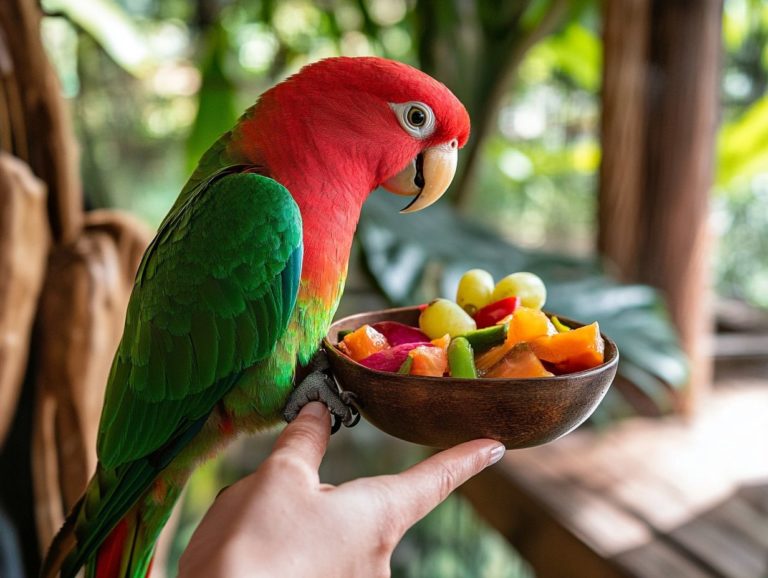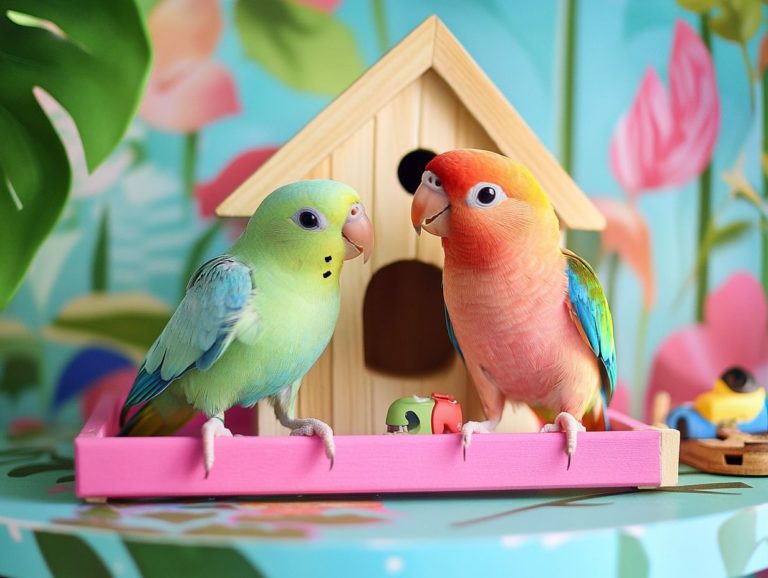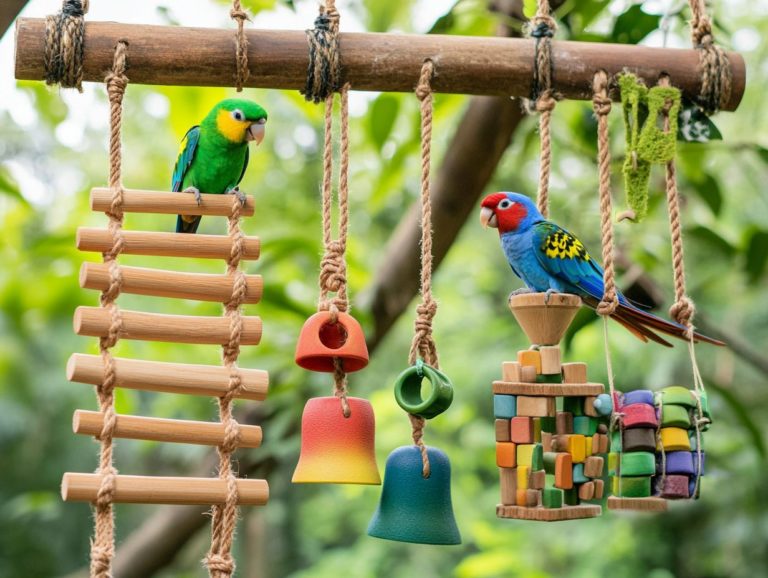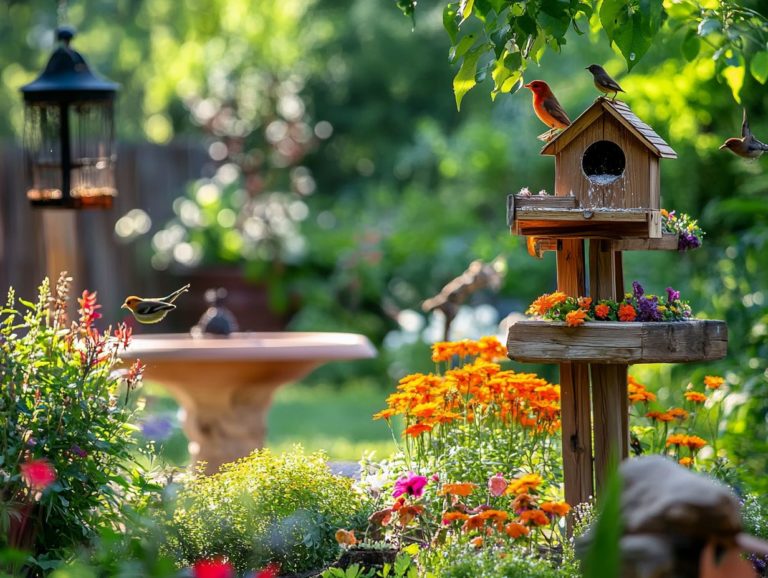Finch Feeding: A Guide to Proper Nutrition
Finches make charming companions. To ensure they thrive, you must understand their nutritional needs. This guide covers the essential nutrients vital for their health and offers practical advice on feeding finches in captivity. It also highlights common pitfalls that could lead to nutritional deficiencies.
This guide also explains how to use supplements and the specific food needs for various finch species. By the end, you ll be ready to give your finches a fantastic life!
Contents
Key Takeaways:
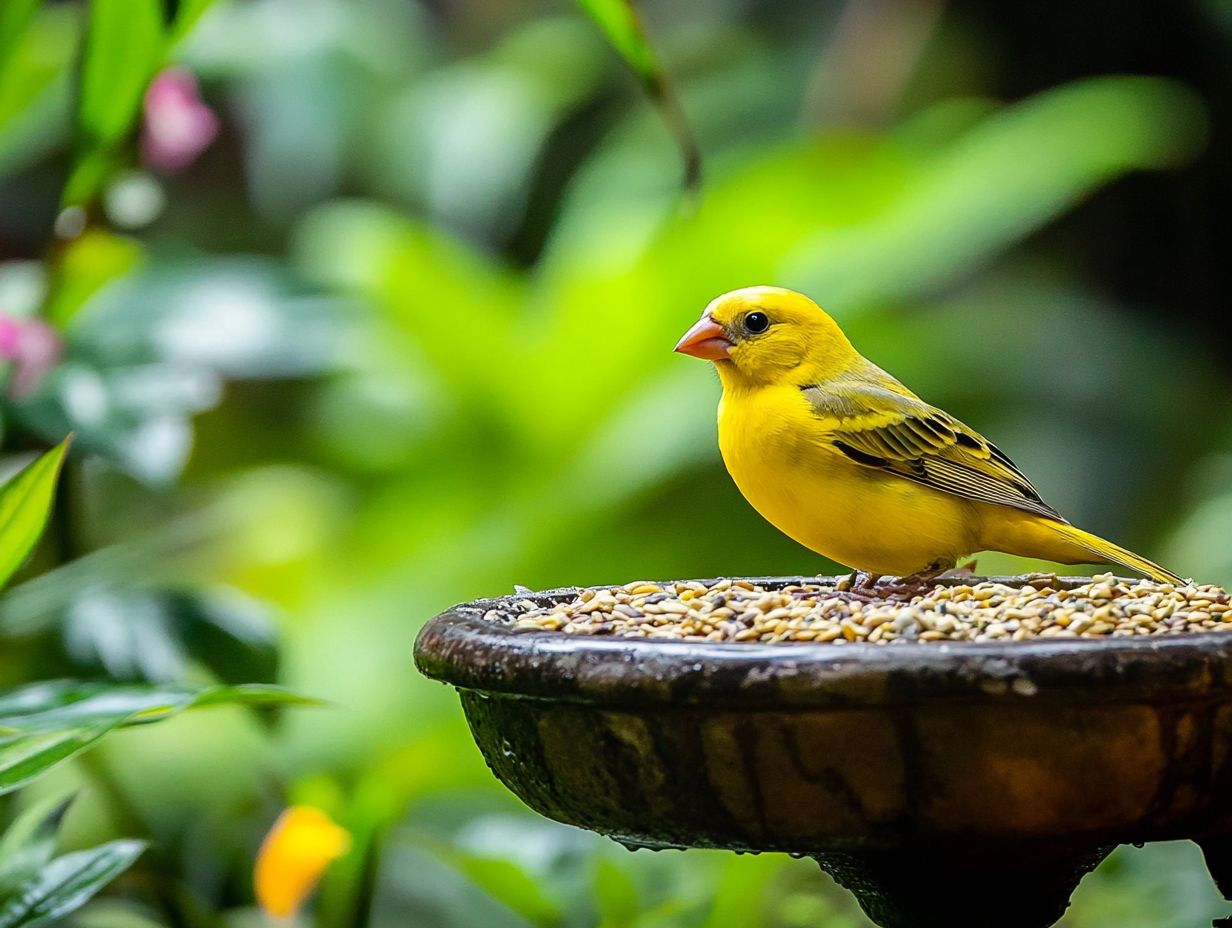
- Proper nutrition is essential for finches’ health and well-being. Key nutrients like protein, vitamins, and minerals are crucial.
- Feed finches a varied diet of seeds, fruits, and vegetables. Establish a feeding schedule for consistency.
- Avoid common mistakes, such as overfeeding or providing only one type of food. Use supplements sparingly and only as needed.
Understanding Finch Nutrition
Understanding finch nutrition is vital for anyone caring for pet finches. It includes what they eat, their nutritional requirements, and the best feeding practices, much like the insights found in understanding lovebird nutrition, to help them thrive.
By addressing these factors, you can enhance your feeding success and nurture vibrant and active finches. Knowing about avian nutrition enables you to provide a balanced diet that caters to their unique needs and natural instincts, ensuring a long and healthy life for your feathered companions.
Key Nutrients for Optimal Health
The key nutrients for optimal health in finches include a well-rounded blend of proteins, vitamins, and calcium, which are all essential for their well-being.
These nutrients support various bodily functions, from feather development to strengthening the immune system. Millet seed provides rich carbohydrates, while fresh fruits and vegetables deliver vital vitamins like A and C, enhancing growth and vitality.
Choosing specially formulated diets designed for finches ensures a balanced intake of these nutrients and prevents deficiencies that could lead to serious health issues, such as weakened bones or impaired feather growth.
By understanding the importance of tailored nutrition, you not only nurture vibrant plumage but also promote longevity and robust health in these delightful birds.
Feeding Finches in Captivity
Feeding finches in captivity requires a thoughtful strategy that combines feeding practices, specially formulated diets, and a consistent feeding schedule to meet their varied nutritional needs.
Provide a diverse array of fresh foods, including vegetables and fruits, in addition to seed mixes for a healthy diet.
Be vigilant about avoiding toxic foods that could compromise their health. Maintaining proper feeding hygiene and understanding finches’ dietary preferences can significantly impact their overall well-being and longevity. Offering safe foods is crucial, too.
Types of Food and Feeding Schedule

Finches flourish when offered a delightful array of foods, from fresh vegetables and fruits to seed mixes and even live treats like mealworms. It s essential to incorporate these into a thoughtfully designed feeding schedule.
To promote their optimal health, you ll want to provide fresh greens such as spinach and kale, both of which are rich in essential vitamins and minerals. Fruits like apples, berries, and oranges are crucial. They deliver important antioxidants that can enhance their immune system.
Your seed mixes should be diverse, containing favorites such as millet, Nyjer, and sunflower chips:
- Canary seeds
- Millet
- Flaxseed
This variety ensures a balanced intake of protein and fats. Incorporating live foods like mealworms can significantly boost their protein intake, especially during breeding season.
By regularly refreshing their diet, you not only keep finches engaged but also nourish them effectively. This fosters longevity and vibrant plumage. Be sure to explore various bird food options to maintain their interest.
Common Mistakes in Finch Feeding
Don t let your finches miss out! Here are common feeding mistakes to avoid. Common mistakes in finch feeding typically arise from misconceptions about dietary choices. These can lead to a lack of important nutrients that negatively impact their feeding habits and overall health.
Many finch owners often underestimate the significance of a varied diet, essential for fostering feeding success.
Without this diversity, you risk creating imbalances that could undermine your finch’s vitality. To avoid these pitfalls, it’s important to be acutely aware of your finch’s dietary needs and adopt a well-informed approach to their nutrition.
Avoiding Nutritional Deficiencies
To prevent nutritional deficiencies in your finches, it’s vital to adopt effective feeding strategies that combine high-quality foods with specific powders that add missing nutrients.
Crafting a balanced diet for these delightful birds means incorporating a variety of seed types, fruits, and leafy greens into their daily routine. For example, offering a mix of millet, canary seed, and specially formulated finch blends can significantly boost their nutritional intake. Fresh vegetables like kale and carrots are also excellent sources of essential vitamins and minerals.
Keep an eye on your finches for signs of nutrient lack, such as dull plumage, lethargy, or changes in behavior. If you notice these symptoms, consider adding specific multivitamins or powdered calcium that you can mix in their food to restore balance and promote their optimal health.
Supplements for Finch Nutrition
Supplements are vital for their health, offering crucial nutrients that might be missing from their everyday diet. Calcium and protein, in particular, are vital for breeding birds and contribute significantly to overall finch health.
By integrating the right supplements, such as calcium and protein requirements, you ensure that your finches thrive and flourish.
When and How to Use Supplements

Understanding when and how to use supplements is essential for maintaining the health of your finches, especially during breeding seasons or when introducing new foods into their diet.
These critical periods can greatly influence their nutritional requirements. Breeding finches need extra vitamins and minerals to support both their reproductive health and the development of their chicks. Likewise, sudden shifts in their diet can leave them vulnerable to deficiencies, highlighting the importance of timely supplement additions.
To seamlessly integrate these into your feeding strategies, consider gradually mixing the supplements with their regular seed blends or offering them as enticing treats. By observing your birds’ reactions, you’ll be able to fine-tune the right balance and timing, ensuring they thrive and remain vibrant during these pivotal stages.
Feeding for Specific Finch Species
Caring for specific finch species demands a keen understanding of their distinct dietary needs and feeding habits. Every finch species is unique! Discover the special dietary needs of your finch to keep them healthy and happy.
Each type of finch has its own unique nutritional requirements, and as a finch owner, it’s essential that you accommodate these needs thoughtfully.
Learn more about your finch’s specific needs to keep them thriving!
Dietary Needs for Different Finch Types
Different types of finches have specific dietary needs that you should address with a targeted feeding guide to ensure a healthy diet and optimal growth.
Understanding these needs is crucial for you whether you re a dedicated pet owner or a bird enthusiast. Some finch species enjoy a diverse variety of seeds, while others may require extra nutrients such as protein or specific vitamins to truly thrive.
Seed preferences can vary widely. For example, canaries often gravitate toward grass seeds, while society finches relish a blend that includes crushed seeds and commercial mixes.
Don t forget to incorporate fresh fruits, leafy greens, and even occasional protein sources like boiled eggs or mealworms into their diet. By rotating food types and closely monitoring your finch s health, you can greatly enhance their overall well-being and vibrancy.
Frequently Asked Questions
Discover what finches need in their diet to ensure proper nutrition!

Finches require a balanced diet consisting of high-quality seeds, fresh fruits and vegetables, and a source of protein such as insects or cooked eggs.
How often should I feed my finches?
Make sure to give your finches fresh food and water every day for a happy and healthy life! This ensures they have access to a variety of nutrients and prevents food from spoiling.
Can I feed my finches table scraps?
No, table scraps are not recommended for finches as they often contain high amounts of salt, sugar, and fat, which are not suitable for their dietary needs.
What types of seeds should I include in my finches’ diet?
Finches enjoy a variety of seeds such as:
- Millet
- Canary seeds
- Safflower seeds
- Nyjer seeds
- Sunflower chips
It is essential to offer a varied diet to ensure they receive balanced nutrition.
Do finches require any supplements in their diet?
If you re feeding a well-balanced diet, including formulated options, supplements are typically not necessary for finches. However, some owners choose to add a calcium supplement to ensure strong bones and healthy eggshell production.
Want to spoil your finches with treats? Here s how!
Yes, you can offer small pieces of fresh fruits and vegetables as treats in moderation. However, these should not make up the majority of their diet, as they can be high in sugar and may lead to health issues if consumed in excess.

